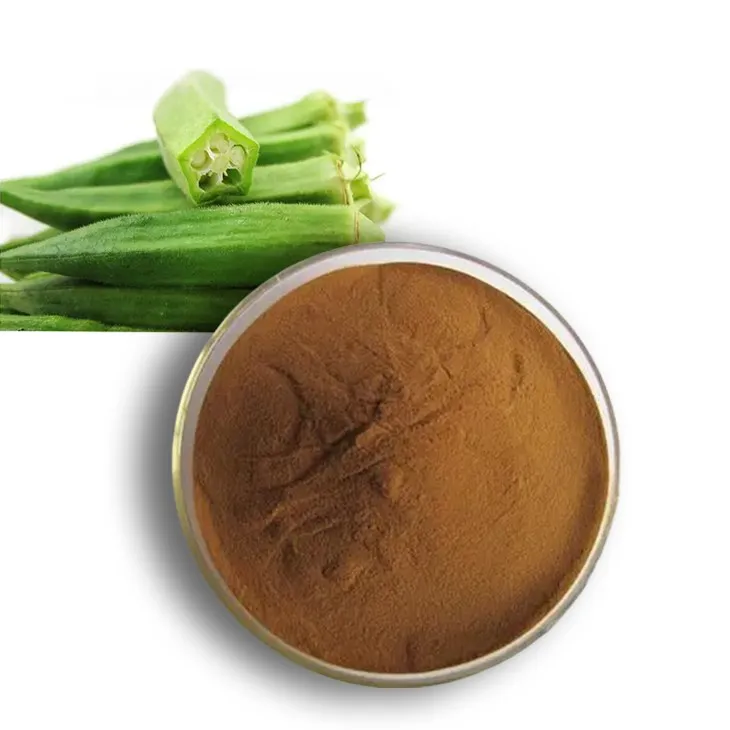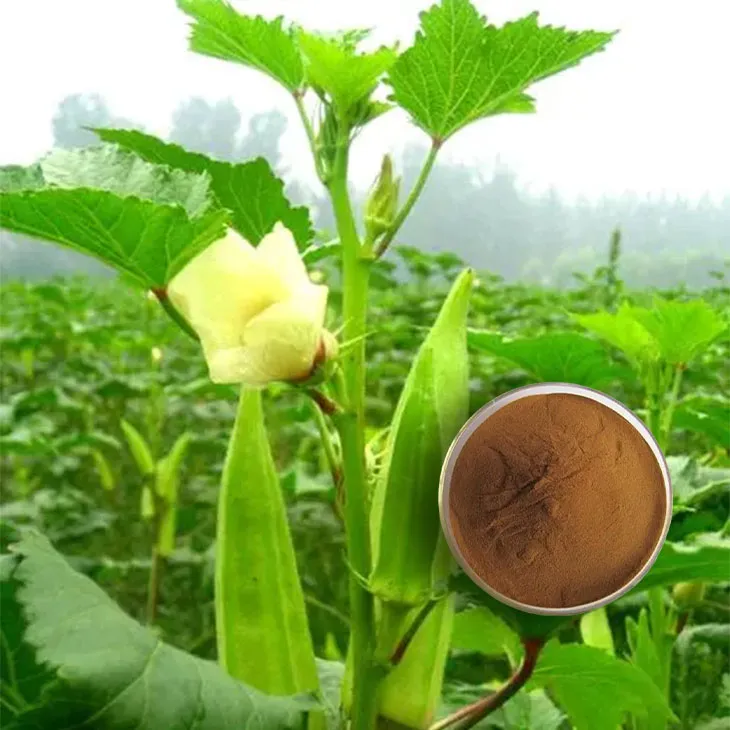- 0086-571-85302990
- sales@greenskybio.com
Okra extract can reduce high blood pressure.
2024-11-13

1. Introduction
High blood pressure, or hypertension, is a global health concern that affects a significant portion of the population. It is a major risk factor for various cardiovascular diseases, including heart attacks, strokes, and heart failure. Conventional treatments for high blood pressure often involve medications, but there is an increasing interest in exploring natural alternatives. Okra, a widely consumed vegetable in many parts of the world, has shown potential in this regard. Okra Extract is being studied for its ability to reduce high blood pressure, and this article will delve into the scientific basis behind this potential, as well as how it can be incorporated into a lifestyle for those with hypertension.

2. The Nutritional Profile of Okra
Before exploring the effects of Okra Extract on blood pressure, it is important to understand the nutritional composition of okra itself. Okra is rich in various nutrients that may contribute to its potential health benefits.
2.1 Vitamins
Okra contains vitamins such as vitamin C, which is an antioxidant that helps protect cells from damage. It also has vitamin K, which is essential for blood clotting and bone health. These vitamins may play an indirect role in blood pressure regulation by maintaining overall health.
2.2 Minerals
Among the minerals present in okra, potassium is particularly notable. Potassium is known to counteract the effects of sodium in the body. High sodium intake can lead to increased blood pressure, and potassium helps by promoting the excretion of sodium through the kidneys. Additionally, okra contains magnesium, which is involved in muscle relaxation and may also have a role in blood pressure regulation.
2.3 Dietary Fiber
Okra is a good source of dietary fiber. Fiber has multiple health benefits, including improving digestion and helping to control blood sugar levels. In the context of blood pressure, fiber may help by reducing cholesterol levels, which are often associated with hypertension.

3. Scientific Mechanisms of Okra Extract in Reducing High Blood Pressure
The potential of okra extract to reduce high blood pressure is attributed to several scientific mechanisms.
3.1 Effects on Blood Vessels
One of the key mechanisms is its impact on blood vessels. Okra extract may contain bioactive compounds that help relax the smooth muscles in the walls of blood vessels. When these muscles relax, the blood vessels dilate, allowing for easier blood flow. This reduces the resistance in the blood vessels, which in turn can lower blood pressure. For example, certain flavonoids present in okra extract may act as vasodilators, promoting this relaxation process.
3.2 Regulation of Hormones
Okra extract may also play a role in regulating hormones related to blood pressure. It could potentially influence the renin - angiotensin - aldosterone system (RAAS). This system is crucial in maintaining blood pressure homeostasis. If the RAAS is overactive, it can lead to increased blood pressure. Some components in okra extract might inhibit the production or activity of renin, an enzyme in this system, thereby reducing the overall blood pressure - elevating effects of the RAAS.
3.3 Antioxidant Activity
The antioxidant activity of okra extract is another important aspect. Oxidative stress is associated with hypertension. Free radicals can damage blood vessels and cells, leading to increased blood pressure. The antioxidants in okra extract, such as phenolic compounds, can scavenge these free radicals, protecting the blood vessels and reducing the oxidative stress. This, in turn, may contribute to the lowering of blood pressure.

4. Different Forms of Okra Extract
Okra extract can be obtained in different forms, each with its own characteristics and potential uses.
4.1 Liquid Extract
The liquid extract is often made by extracting the active compounds from okra using solvents such as water or alcohol. It is relatively easy to consume and can be added to beverages like water or juice. This form is convenient for those who prefer a more direct and simple way of incorporating okra extract into their daily routine.
4.2 Powdered Extract
Powdered okra extract is made by drying and grinding the okra extract. It can be added to foods such as smoothies, yogurt, or oatmeal. This form offers more versatility in terms of incorporation into different types of diets. For example, it can be used in baking as well, although the heat may affect some of the bioactive compounds to a certain extent.
4.3 Capsule Supplements
Okra extract is also available in capsule form as a dietary supplement. These capsules are convenient for those who may not like the taste of okra or find it difficult to incorporate the extract in other forms into their diet. However, it is important to ensure that the capsules are from a reliable source and are properly standardized to contain the appropriate amount of active ingredients.
5. Incorporating Okra Extract into the Diet for High Blood Pressure Management
There are several ways to incorporate okra extract into a diet for the management of high blood pressure.
5.1 Dietary Additions
- As mentioned earlier, liquid okra extract can be added to drinks. A small amount, such as 1 - 2 teaspoons per day, can be a good starting point. This can be gradually increased depending on individual tolerance and response.
- Powdered okra extract can be sprinkled on top of various foods. For example, adding a teaspoon of powdered extract to a morning bowl of oatmeal can provide a nutritional boost while also potentially contributing to blood pressure control.
5.2 Recipe Modifications
Okra can be used in cooking in various ways, and these recipes can be modified to include more of its extract. For instance, when making okra - based soups or stews, additional okra extract can be added towards the end of the cooking process to preserve the bioactive compounds. Another idea is to make okra - infused oils, which can be used in salad dressings or for light cooking, providing a concentrated source of okra's beneficial components.
5.3 Combining with Other Blood - Pressure - Friendly Foods
Okra extract can be combined with other foods known to be beneficial for blood pressure control. For example, pairing it with foods rich in omega - 3 fatty acids like salmon or flaxseeds can have a synergistic effect. Omega - 3 fatty acids also help in reducing inflammation and improving blood vessel function, which complements the actions of okra extract in lowering blood pressure.
6. Precautions and Considerations
While okra extract shows promise in reducing high blood pressure, there are some precautions and considerations to keep in mind.
6.1 Allergic Reactions
Some individuals may be allergic to okra. Allergic reactions can range from mild symptoms such as itching and rashes to more severe ones like difficulty breathing. Before starting to use okra extract, it is important to check for any known allergies to okra or related plants.
6.2 Interaction with Medications
If a person is already taking medications for high blood pressure, it is crucial to consult a healthcare provider before adding okra extract. There is a possibility of interactions between okra extract and certain medications. For example, okra's potassium content may interact with potassium - sparing diuretics, potentially leading to hyperkalemia (high potassium levels in the blood).
6.3 Dosage and Standardization
The appropriate dosage of okra extract is still being studied. It is important to follow the recommended dosage on the product label when using commercial okra extract products. However, more research is needed to establish standardized dosages that are both effective and safe for different individuals.
7. Future Research Directions
Although there is evidence suggesting the potential of okra extract in reducing high blood pressure, more research is needed in several areas.
7.1 Clinical Trials
Large - scale clinical trials are required to further confirm the effectiveness of okra extract in humans. These trials should involve a diverse population, including different age groups, genders, and ethnicities, to ensure the generalizability of the results. Additionally, long - term follow - up in these trials is essential to assess the sustainability of the blood pressure - lowering effects.
7.2 Mechanistic Studies
While some mechanisms have been proposed, more in - depth mechanistic studies are needed. For example, further research is required to fully understand how okra extract interacts with the various components of the RAAS at the molecular level. This will help in developing more targeted and effective interventions using okra extract.
7.3 Product Development
There is a need for the development of high - quality okra extract products. This includes improving the extraction methods to preserve more of the bioactive compounds, as well as ensuring proper standardization of the products. Research into new formulations, such as sustained - release capsules or more palatable liquid extracts, can also enhance the acceptability and effectiveness of okra extract as a blood pressure - reducing agent.
8. Conclusion
Okra extract holds great promise as an agent for reducing high blood pressure. Its potential is based on its nutritional composition and the various scientific mechanisms through which it may act on blood vessels, regulate hormones, and reduce oxidative stress. Different forms of okra extract offer flexibility in its incorporation into a diet or as a supplement. However, precautions such as allergic reactions, potential interactions with medications, and proper dosage need to be considered. Future research, including clinical trials, mechanistic studies, and product development, will further clarify the role of okra extract in the management of high blood pressure and may lead to its wider acceptance and use as a natural alternative for blood pressure control.
FAQ:
What are the main components in okra extract that may help reduce high blood pressure?
Okra extract contains various components that may contribute to blood pressure reduction. One of the main components is mucilage, which has a positive impact on the digestive system and may also play a role in regulating blood pressure. Additionally, okra is rich in antioxidants, such as flavonoids and phenolic compounds. These antioxidants can help reduce oxidative stress in the body, which is often associated with hypertension. Another component is potassium. Potassium helps balance sodium levels in the body, and an appropriate potassium - sodium ratio is crucial for maintaining normal blood pressure.
How does okra extract affect blood vessels to reduce high blood pressure?
Okra extract can have a positive impact on blood vessels in several ways. Firstly, it may help relax the smooth muscles in the walls of blood vessels. When these muscles relax, the blood vessels dilate, allowing for easier blood flow and thus reducing blood pressure. This relaxation effect may be due to certain bioactive compounds in the okra extract. Secondly, it can also improve the endothelial function of blood vessels. The endothelium is the inner lining of blood vessels, and when it functions well, it helps regulate blood pressure by releasing substances such as nitric oxide. Okra extract may enhance the production or activity of nitric oxide, which further promotes vasodilation.
What are the different forms of okra extract available?
There are mainly two forms of okra extract available. One is the liquid extract, which is often made by extracting the beneficial components of okra using solvents such as water or alcohol. This form is relatively easy to consume and can be added to beverages or used in cooking in small amounts. The other form is the powdered extract. The powdered form is more concentrated and can be made into capsules or added to food products. It is convenient for those who prefer to take supplements in a more concentrated and portable form.
Can okra extract be used as a sole treatment for high blood pressure?
While okra extract shows potential in reducing high blood pressure, it is not recommended to be used as a sole treatment. High blood pressure is a complex medical condition that often requires a comprehensive approach. Lifestyle changes such as a healthy diet (including reducing sodium intake, increasing fruits and vegetables consumption), regular exercise, and stress management are fundamental. In addition, for many patients, medications prescribed by a doctor are necessary to control blood pressure effectively. Okra extract can be considered as a complementary approach, potentially helping to enhance the overall management of high blood pressure, but it should not replace medical treatment.
How much okra extract should be consumed daily for blood pressure reduction?
There is no standardized recommended daily dose of okra extract for blood pressure reduction at present. The appropriate amount may vary depending on factors such as an individual's overall health, the severity of their high blood pressure, and other medications or supplements they are taking. However, in general, if using okra extract as a supplement, it is advisable to start with a small amount and gradually increase while closely monitoring blood pressure. It is also crucial to consult a healthcare provider before starting any new supplement regimen to ensure safety and effectiveness.
Related literature
- The Potential of Okra (Abelmoschus esculentus) in Cardiovascular Health"
- "Okra Extract and Its Impact on Blood Pressure Regulation: A Review"
- "Antihypertensive Properties of Okra - Based Compounds"
- ▶ Hesperidin
- ▶ Citrus Bioflavonoids
- ▶ Plant Extract
- ▶ lycopene
- ▶ Diosmin
- ▶ Grape seed extract
- ▶ Sea buckthorn Juice Powder
- ▶ Fruit Juice Powder
- ▶ Hops Extract
- ▶ Artichoke Extract
- ▶ Mushroom extract
- ▶ Astaxanthin
- ▶ Green Tea Extract
- ▶ Curcumin
- ▶ Horse Chestnut Extract
- ▶ Other Product
- ▶ Boswellia Serrata Extract
- ▶ Resveratrol
- ▶ Marigold Extract
- ▶ Grape Leaf Extract
- ▶ New Product
- ▶ Aminolevulinic acid
- ▶ Cranberry Extract
- ▶ Red Yeast Rice
- ▶ Red Wine Extract
-
Citrus bioflavonoids
2024-11-13
-
Berberis aristata Extract
2024-11-13
-
Aminolevulinic acid
2024-11-13
-
Troxerutin
2024-11-13
-
Oyster Mushroom Extract Powder
2024-11-13
-
Hesperidin
2024-11-13
-
Maitake Mushroom Extract
2024-11-13
-
Oat Straw Extract Powder
2024-11-13
-
Shikonin
2024-11-13
-
Aguaje Extract
2024-11-13





















